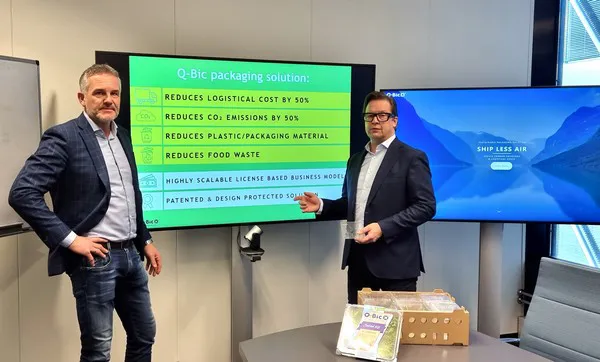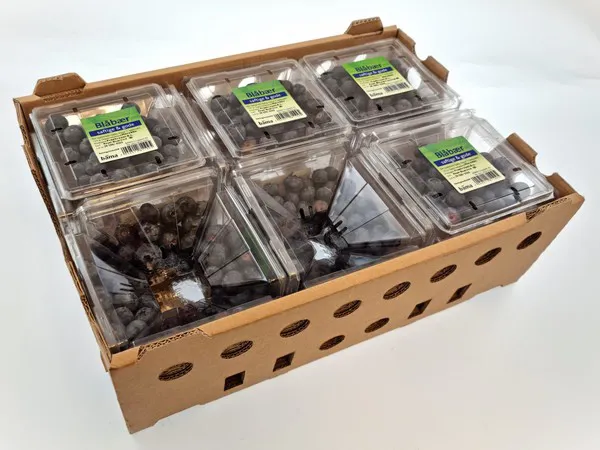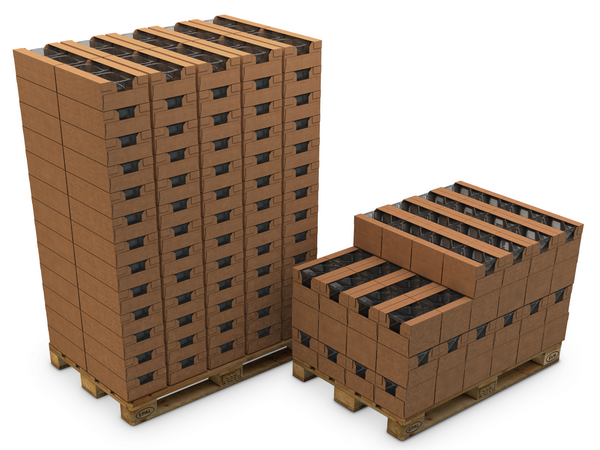The shape of the cups, whether they are filled with berries, fruit or salad can cut major costs related to transport and logistics, storage and cooling, packaging and emission of greenhouse gases.

The management of Q-Bic, Stian Valentin Knutsen and Bjørn Sloreby
The idea makers and developers behind Norway's Q-Bic®, say the grocery industry produces and transports an unnecessary amount of air in today's packaging. The small entrepreneurial company with headquarters in Norway has recently delivered its second batch of salad trays to Sensei. This North American company grows, packs and sells, among other things, large quantities of fresh lettuce to consumers in Canada. They received several hundred thousand trays and the first salads in new packaging are currently on their way to stores in Canada.
With Q-Bic, producers and distributors will roughly have room for twice as much lettuce on a pallet compared to using traditional packaging. Users of the design will save significant amounts of packaging. In Norway, Q-Bic is in dialogue with several major players in the grocery industry. The tiny pyramid cup has found a place at Bama, which initially buys 200 000 cups for packaging blueberries.
“We’re working continuously to improve and develop better solutions that protects the products sufficiently, has the lowest possible environmental impact and the highest possible degree of material recycling. In this work, we test different solutions in order to gain experience. Q-Bic is one of these," writes Bama’s communications director Pia Gulbrandsen in an e-mail.

Each of the 200,000 pyramid-shaped cups from Q-Bic will be filled with 125 grams of blueberries under the auspices of Bama.
Thinking inside the box
Founder and inventor Stian Valentin Knutsen says they go a little against the flow, and has the motto of "thinking inside the box". “I grew tired of hearing from people who worked with innovation that you have to think outside the box. When I was challenged by a large Norwegian grocery manufacturer to develop a new type of packaging, I wanted to change the narrative. The challenge was to find a packaging solution for various types of goods, packaged on the same pallet while minimizing the amount of air. This was the start of the process that led to pyramid-shaped square cups, which with 6 cups form cubes with only 8% air and thus utilize a given volume as efficiently as possible.”
In dialogue with major players
Q-Bic® is in ongoing dialogue with several of the largest suppliers to the American grocery market and has also had a breakthrough with BAMA in Norway, which is a global player in the production, distribution and sale of fruit and vegetables.
“Together with DOLE, which produces fruit cups in large numbers, we have carried out a consumer test where Q-Bic scored significantly better than existing packaging.
Material independent
The Q-Bic managers point to how much fuel and greenhouse gas emissions their packaging will help to save in transport, but also in terms of freezing, cooling and storage. In addition, they say the need for cardboard to wrap cups and other packaging is reduced by 30-40%. Q-Bic will put aside the actual production of cups, in exchange for a royalty of a few cents per cup. Tools to produce packaging will be provided by Q-Bic itself in cooperation with subcontractors.
The company’s patents are based on form and method and are material independent. He adds that they have had test batches made from recyclable plastic, cardboard and other degradable materials.

On the pallet on the left are stacked 520 salad cups of today's standard. On the pallet to the right is piled some more lettuce packed in 528 of Q-Bic's new pyramid shaped cups.
EU and packaging
Inventor Knutsen highlights one more point that speaks in favor of the pyramid-shaped branches. "When six pyramids are stacked like a cube, forces are distributed evenly in all directions, and thus the packaging withstands more impact and pressure than today's most used packaging for fruit, berries and salads. This way you can reduce the extent of damage and wastage during transport and storage.
They also believe the timing for their innovation is now favorable with EU regulation about less packaging use. As a result, packages must contain more product and less air.
Q-Bic will have a booth at the Ecommerce Packaging and Labelling Expo in London on February 28th and March 1st. Their stand is PE 2421. On Wednesday 28 they will give a lecture at Theater 11 from 12:30-13:00.
For more information:
Bjørn Sloreby
Smart Packaging Industries AS
Tel: +47 916 24 420
Email: [email protected]
www.q-bic.com
